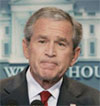| President Bush defended his administration's detention and interrogation policies for terrorism suspects on Friday, saying they are both successful and lawful. "When we find somebody who may have information regarding a potential attack on America, you bet we're going to detain them, and you bet we're going to question them," he said during a hastily called appearance in the Oval Office. "The American people expect us to find out information, actionable intelligence so we can help protect them. That's our job." Bush was referring to a report on two secret memos in 2005 that authorized extreme interrogation tactics against terror suspects. "This government does not torture people," the president said. The two Justice Department legal opinions were disclosed in Thursday's editions of The New York Times, which reported that the first 2005 legal opinion authorized the use of head slaps, freezing temperatures and simulated drownings, known as waterboarding, while interrogating terror suspects, and was issued shortly after then-Attorney General Alberto Gonzales took over the Justice Department. That secret opinion, which explicitly allowed using the painful methods in combination, came months after a December 2004 opinion in which the Justice Department publicly declared torture "abhorrent" and the administration seemed to back away from claiming authority for such practices. A second Justice opinion was issued later in 2005, just as Congress was working on an anti-torture bill. That opinion declared that none of the CIA's interrogation practices would violate the rules in the legislation banning "cruel, inhuman and degrading" treatment of detainees, The Times said, citing interviews with unnamed current and former officials. "We stick to U.S. law and international obligations," the president said, without taking questions afterward. White House and Justice Department press officers have said the 2005 opinions did not reverse the 2004 policy. Bush, speaking emphatically, noted that "highly trained professionals" conduct any questioning. "And by the way," he said, "we have gotten information from these high-value detainees that have helped protect you." He also said that the techniques used by the United States "have been fully disclosed to appropriate members of the United States Congress" — an indirect slap at the torrent of criticism that has flowed from the Democratic-controlled Congress since the memos' disclosure. "The American people expect their government to take action to protect them from further attack," Bush said. "And that's exactly what this government is doing. And that's exactly what we'll continue to do." The 2005 opinions approved by Gonzales remain in effect despite efforts by Congress and the courts to limit interrogation practices used by the government in response to the Sept. 11, 2001, terrorist attacks. The authorizations came after the withdrawal of an earlier classified Justice opinion, issued in 2002, that had allowed certain aggressive interrogation practices so long as they stopped short of producing pain equivalent to experiencing organ failure or death. That controversial memo was withdrawn in June 2004. The dispute may come down to how the Bush administration defines torture, or whether it allowed U.S. interrogators to interpret anti-torture laws beyond legal limits. CIA spokesman George Little said the agency sought guidance from the Bush administration and Congress to make sure its program to detain and interrogate terror suspects followed U.S. law. Senate and House Democrats have demanded to see the memos. "Why should the public have confidence that the program is either legal or in the best interests of the United States?" Senate Intelligence Committee Chairman Jay Rockefeller, D-W.Va., wrote in a letter to the acting attorney general. House Judiciary Chairman John Conyers and Rep. Jerrold Nadler, D-N.Y., promised a congressional inquiry. Sen. John McCain, R-Ariz., said he was "personally assured by administration officials that at least one of the techniques allegedly used in the past, waterboarding, was prohibited under the new law." A White House spokesman, meanwhile, criticized the leak of such information to the news media and questioned the motivations of those who do so. "It's troubling," Tony Fratto said Friday. "I've had the awful responsibility to have to work with The New York Times and other news organizations on stories that involve the release of classified information. And I can tell you that every time I've dealt with any of these stories, I have felt that we have chipped away at the safety and security of America with the publication of this kind of information." |





